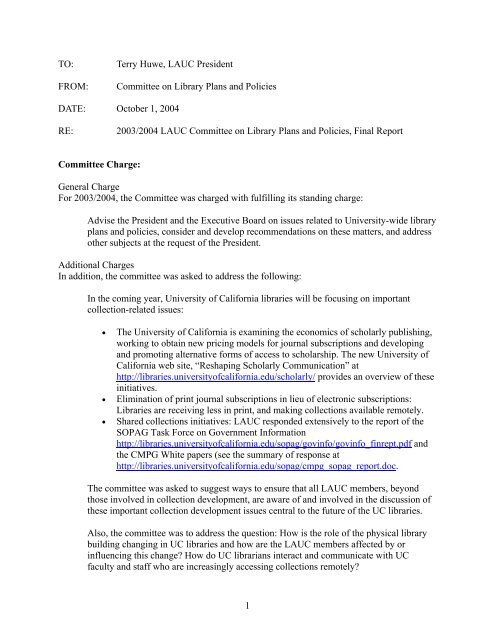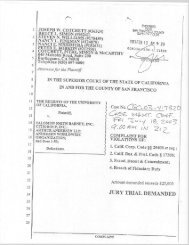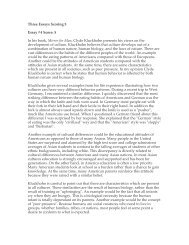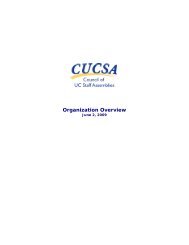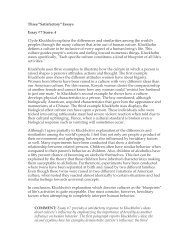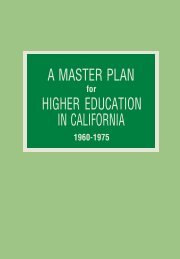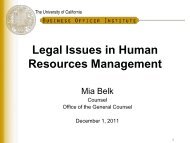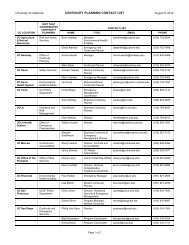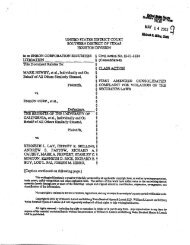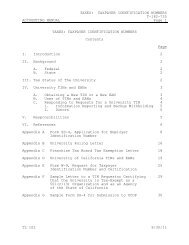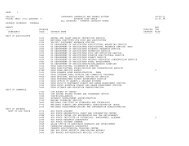Terry Huwe, LAUC President FROM - University of California | Office ...
Terry Huwe, LAUC President FROM - University of California | Office ...
Terry Huwe, LAUC President FROM - University of California | Office ...
Create successful ePaper yourself
Turn your PDF publications into a flip-book with our unique Google optimized e-Paper software.
TO: <strong>Terry</strong> <strong>Huwe</strong>, <strong>LAUC</strong> <strong>President</strong><br />
<strong>FROM</strong>: Committee on Library Plans and Policies<br />
DATE: October 1, 2004<br />
RE: 2003/2004 <strong>LAUC</strong> Committee on Library Plans and Policies, Final Report<br />
Committee Charge:<br />
General Charge<br />
For 2003/2004, the Committee was charged with fulfilling its standing charge:<br />
Advise the <strong>President</strong> and the Executive Board on issues related to <strong>University</strong>-wide library<br />
plans and policies, consider and develop recommendations on these matters, and address<br />
other subjects at the request <strong>of</strong> the <strong>President</strong>.<br />
Additional Charges<br />
In addition, the committee was asked to address the following:<br />
In the coming year, <strong>University</strong> <strong>of</strong> <strong>California</strong> libraries will be focusing on important<br />
collection-related issues:<br />
• The <strong>University</strong> <strong>of</strong> <strong>California</strong> is examining the economics <strong>of</strong> scholarly publishing,<br />
working to obtain new pricing models for journal subscriptions and developing<br />
and promoting alternative forms <strong>of</strong> access to scholarship. The new <strong>University</strong> <strong>of</strong><br />
<strong>California</strong> web site, “Reshaping Scholarly Communication” at<br />
http://libraries.university<strong>of</strong>california.edu/scholarly/ provides an overview <strong>of</strong> these<br />
initiatives.<br />
• Elimination <strong>of</strong> print journal subscriptions in lieu <strong>of</strong> electronic subscriptions:<br />
Libraries are receiving less in print, and making collections available remotely.<br />
• Shared collections initiatives: <strong>LAUC</strong> responded extensively to the report <strong>of</strong> the<br />
SOPAG Task Force on Government Information<br />
http://libraries.university<strong>of</strong>california.edu/sopag/govinfo/govinfo_finrept.pdf and<br />
the CMPG White papers (see the summary <strong>of</strong> response at<br />
http://libraries.university<strong>of</strong>california.edu/sopag/cmpg_sopag_report.doc.<br />
The committee was asked to suggest ways to ensure that all <strong>LAUC</strong> members, beyond<br />
those involved in collection development, are aware <strong>of</strong> and involved in the discussion <strong>of</strong><br />
these important collection development issues central to the future <strong>of</strong> the UC libraries.<br />
Also, the committee was to address the question: How is the role <strong>of</strong> the physical library<br />
building changing in UC libraries and how are the <strong>LAUC</strong> members affected by or<br />
influencing this change? How do UC librarians interact and communicate with UC<br />
faculty and staff who are increasingly accessing collections remotely?<br />
1
Summary <strong>of</strong> Activity:<br />
The Committee met by teleconference on April 12, 2004. Discussion began with the two issues<br />
mentioned under “Additional Charges”. Listed with each <strong>of</strong> the issues below were possible<br />
discussion topics.<br />
Awareness <strong>of</strong> collection development issues<br />
1. Is this a topic <strong>of</strong> discussion by librarians on your campus?<br />
2. Do librarians in your division feel they are up-to-date on this issue?<br />
3. What opportunities do librarians in your division have to learn about collection<br />
development initiatives?<br />
4. What would librarians in your division like to see to help them understand these issues<br />
more fully?<br />
5. Are there any discipline specific issues that related to this topic?<br />
6. What has your library administration done to foster a broader understanding <strong>of</strong> collection<br />
development issues on your campus?<br />
7. What has your local <strong>LAUC</strong> division done to foster a broader understanding <strong>of</strong> collection<br />
development issues on your campus?<br />
8. Has your library had any internal re-organizations that have an impact on this issue?<br />
9. What methods or techniques can we use to ensure that all <strong>LAUC</strong> members are aware <strong>of</strong><br />
and involved in the discussion <strong>of</strong> these collection development issues?<br />
Interactions with faculty and staff in a remote access environment<br />
1. Is this a topic <strong>of</strong> discussion by librarians on your campus?<br />
2. How have your libraries been affected by your faculty’s use <strong>of</strong> remote electronic<br />
resources?<br />
3. Do you have any usage studies that provide insight into this issue?<br />
4. How do you maintain contact with faculty?<br />
5. What communications tools do you use with faculty?<br />
6. How does your library address and respond to faculty concerns?<br />
7. Have you developed any programs or services to bring faculty into the library?<br />
8. What approaches have you taken to establish and maintain relationships with faculty on<br />
your campuses?<br />
9. Do your approaches differ by discipline?<br />
10. Has your library had any internal re-organizations designed to affect librarians’<br />
relationships with faculty?<br />
Some <strong>of</strong> the committee members queried colleagues, either the local Library Plans and Policies<br />
Committee or Executive Board, before the teleconference. The ensuing teleconference discussion<br />
started with these issues but soon moved into a discussion <strong>of</strong> changes in reference service,<br />
reference staffing patterns, and other general public services issues.<br />
Topics regarding collections included the following:<br />
• Mergers <strong>of</strong> reference and collection development units on some campuses are resulting in<br />
more librarians being aware <strong>of</strong> collection issues.<br />
2
• Local <strong>LAUC</strong> division programs have been effective in increasing awareness <strong>of</strong> collection<br />
issues.<br />
• Internal distribution <strong>of</strong> reports related to collection issues as well as other topics<br />
continues to be an important way to improve awareness <strong>of</strong> issues affecting the libraries.<br />
• Librarians should consider applying for <strong>LAUC</strong> research funding for projects in this area.<br />
Topics regarding interaction with faculty and staff in a remote environment included the<br />
following:<br />
• We need to highlight and publicize ways that librarians are getting out from behind the<br />
desk and into the classroom; we need to feature ways in which librarians are<br />
indispensable to the educational mission <strong>of</strong> the university.<br />
• Librarians should consider applying for <strong>LAUC</strong> research funding for projects in this area.<br />
Topics regarding general public services issues included the following:<br />
• Libraries are combining information desks and reference desks. Some libraries have a<br />
single service point that combines circulation with reference.<br />
• Reference and collection development issues are becoming more intertwined.<br />
• A wide variety <strong>of</strong> electronic resources accessible from every service location is resulting<br />
in questions <strong>of</strong> any topic being addressed at any service station.<br />
• Nonetheless, with so many electronic resources available, there is an increased need for<br />
specialist assistance for difficult or complex questions, and in fact there is increased need<br />
for subject specialist intervention.<br />
• Complexity <strong>of</strong> reference questions has increased.<br />
• On some campuses, the volume <strong>of</strong> reference transactions has increased due to services<br />
delivered on the web site.<br />
• Users have higher expectations from the library with increased availability <strong>of</strong> electronic<br />
resources.<br />
• Everyone who works at reference desks needs to have sound understanding <strong>of</strong> UC<br />
collection development and scholarly communications practices.<br />
• In-service training is critical – to help people to do a better job as generalists and to retain<br />
their expertise as specialists.<br />
• Selectors are increasingly being involved with reference functions.<br />
• There is a myth that instruction reduces reference follow-up; in fact, it reduces the<br />
frequency <strong>of</strong> simple questions and increases the complexity <strong>of</strong> questions we receive.<br />
• Some libraries are combining service points (UC Berkeley, UC Davis to name two).<br />
• Electronic collections are changing user perceptions so that they do not always see the<br />
relationship between electronic resources and the library as an institution.<br />
• Reference desks are being staffed by a mix <strong>of</strong> types <strong>of</strong> personnel (students, staff, and<br />
librarians). This has the advantage <strong>of</strong> <strong>of</strong>fering support and consultation for students, who<br />
may have previously staffed desks by themselves.<br />
• Some desks are only getting directional or basic holdings/access types <strong>of</strong> questions – for<br />
example, desks that are tucked away in more remote locations.<br />
• We are sometimes serving non-target audiences during times such as weekends.<br />
• There is a greater need for UC librarians to be generalists, and sometimes this dilutes<br />
one’s subject expertise.<br />
3
• Two different models <strong>of</strong> reference service were described. In one model, users are more<br />
likely to encounter a generalist (and in some cases a non-pr<strong>of</strong>essional) at the service desk.<br />
In the other model, used at UC Berkeley, users were quickly directed toward making a<br />
connection with a subject specialist. Some felt this model was not economically feasible.<br />
• There is growing tension on the part <strong>of</strong> subject specialists who are required to work in<br />
settings requiring generalists or in subjects outside <strong>of</strong> their areas <strong>of</strong> expertise.<br />
Resources<br />
The following resources were mentioned by committee members:<br />
• UCSB Collection Development Training Manual (including the Collection Manager’s<br />
Orientation Program (http://www.library.ucsb.edu/collman/index.html)<br />
• UCSB’s First Day Kit for New Collection Managers<br />
(http://www.library.ucsb.edu/collman/firstday.html)<br />
• Forte, E. el al, Developing a training program for collection managers [at the <strong>University</strong><br />
<strong>of</strong> <strong>California</strong> Santa Barbara]. Library Collections, Acquisitions, and Technical Services,<br />
v. 26, no. 3(2002) p. 299-306. (available through Science Direct)<br />
• Reorganization at the Berkeley campus is described at<br />
http://www.lib.berkeley.edu/AboutLibrary/archive.html (scroll down to Doe/M<strong>of</strong>fitt to<br />
the Task Force on Information and Reference Services at Doe and M<strong>of</strong>fitt)<br />
The committee chair reported at the Spring 2004 Statewide Assembly at UC Riverside.<br />
Committee Members:<br />
Julie Kwan, Chair (Los Angeles) Karen Lindvall-Larson (San Diego)<br />
Elizabeth Edinger (Berkeley) Lisa Mix (San Francisco)<br />
Juri T. Stratford (Davis) Sandy Lewis (Santa Barbara)<br />
Julia M. Gelfand (Irvine) Greg Careaga (Santa Cruz)<br />
Kenneth Furuta (Riverside)<br />
4


